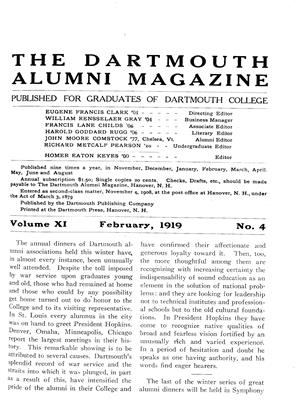Robert Colburn Bacon died at his home in Brattleboro, Vt., January 2, 1919, of pneumonia, following influenza.
He was born in Washington, D. C., March 4, 1874, being a son of R. A. and Josephine (Colburn) Bacon. His parents died in his childhood, and he made his home with an uncle in Springfield, Vt.
After graduation he began the study of law in the office of Waterman, Martin and Hitt of Brattleboro, Vt., continuing it at Boston University and at New York Law School. In 1899 he was admitted to the bar, and began practice in Brattleboro. He was elected a member of the board of village bailiffs in the annual village meeting in May, 1904, and at once was chosen village attorney. In 1906 he was elected state's attorney for the county, and served for the two years term. In July, 1913, he was appointed by the governor member and chairman of the Public Service Commission of the state. His term of office would have expired February 1, 1919, but in November last he resigned the position to devote his whole time to private practice. In 1911 he became president of the Central New Hampshire Power Company.
He was a member of the Masonic lodge, chapter, and commandery, also of the Odd Fellows, the Red Men, the Elks, and the Vermont Wheel Club.
October IS, 1900, Mr. Bacon was married to Georgianna E. Cook of Brattleboro, who survives him. They have had no children.
From a local paper the following is taken: "By the death of Mr. Bacon Vermont loses one of its brightest and most promising lawyers, and Brattleboro a citizen whose sphere of usefulness was exceptional. Possessing unusual mental attainments and a naturally studious disposition, it was a comparatively easy matter for him to achieve a marked degree of success in his chosen profession, which he practiced with an enthusiasm due to an inherent love of the law. Although devoted to the law, he was keenly interested in many other things, in all of which he achieved a surprising degree of knowledge without apparent effort. His familiarity with the best literature, intelligent interest in music, art, and dramatic history, and thorough understanding of numerous technical professions outside of his own all gave evidence of his remarkable talent for mental assimilation. To become interested in any subject, whether the principles of internal combustion engines or the breeding of exhibition dogs, was for him to master all its details and to remember them from that time on. His wide range of knowledge made him an intensely interesting conversationalist, and enabled him to find enjoyment in a wide range of activities. There were few movements of a public nature with which he was not identified. Personally he was a man of many lovable traits, generous to a fault—if fault there be in generosity-sympathetic, loyal, and large-hearte .
 View Full Issue
View Full Issue
More From This Issue
-
 Article
ArticleMILITARY NEWS
February 1919 -
 Article
ArticleTHE STUDENTS' ARMY TRAINING CORPS OF 1918
February 1919 By Edwin J. Bartlett '72 -
 Article
ArticleThe annual dinners of Dartmouth
February 1919 -
 Article
ArticleDARTMOUTH ROLL OF HONOR
February 1919 -
 Article
ArticleDARTMOUTH REUNION IN PARIS
February 1919 -
 Class Notes
Class NotesCLASS OF 1916
February 1919 By Richard Parkhurst








